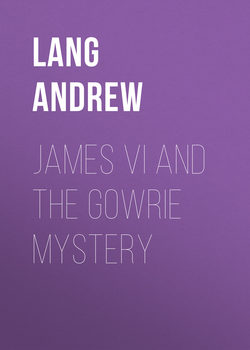Читать книгу James VI and the Gowrie Mystery - Lang Andrew, May Kendall - Страница 5
IV. THE KING’S NARRATIVE – II. THE MAN IN THE TURRET
ОглавлениеWe left James entering the little ‘round,’ or ‘study,’ the turret chamber. Here, at last, he expected to find the captive and the pot of gold. And here the central mystery of his adventure began. His Majesty saw standing, ‘with a very abased countenance, not a bondman but a freeman, with a dagger at his girdle.’ Ruthven locked the door, put on his hat, drew the man’s dagger, and held the point to the King’s breast, ‘avowing now that the King behoved to be at his will, and used as he list; swearing many bloody oaths that if the King cried one word, or opened a window to look out, that dagger should go to his heart.’
If this tale is true, murder was not intended, unless James resisted: the King was only being threatened into compliance with the Master’s ‘will.’ Ruthven added that the King’s conscience must now be burthened ‘for murdering his father,’ that is, for the execution of William, Earl of Gowrie, in 1584. His conviction was believed to have been procured in a dastardly manner, later to be explained.
James was unarmed, and obviously had no secret coat of mail, in which he could not have hunted all day, perhaps. Ruthven had his sword; as for the other man he stood ‘trembling and quaking.’ James now made to the Master the odd harangue reported even in Nicholson’s version of the Falkland letter of the same day. As for Gowrie’s execution, the King said, he had then been a minor (he was eighteen in 1584), and Gowrie was condemned ‘by the ordinary course of law’ – which his friends denied. James had restored, he said, all the lands and dignities of the House, two of Ruthven’s sisters were maids of honour. Ruthven had been educated by the revered Mr. Rollock, he ought to have learned better behaviour. If the King died he would be avenged: Gowrie could not hope for the throne. The King solemnly promised forgiveness and silence, if Ruthven let him go.
Ruthven now uncovered his head, and protested that the King’s life should be safe, if he made no noise or cry: in that case Ruthven would now bring Gowrie to him. ‘Why?’ asked James; ‘you could gain little by keeping such a prisoner?’ Ruthven said that he could not explain; Gowrie would tell him the rest. Turning to the other man, he said ‘I make you the King’s keeper till I come again, and see that you keep him upon your peril.’ He then went out, and locked the door. The person who later averred that he had been the man in the turret, believed that Ruthven never went far from the door. James believed, indeed averred, that he ran downstairs, and consulted Gowrie.
If there was an armed man in the turret, he was either placed there by the King, to protect him while he summoned his minions by feigned cries of treason, or he was placed there by Gowrie to help the Master to seize the King. In the latter case, the Master’s position was now desperate; in lieu of an ally he had procured a witness against himself. Great need had he to consult Gowrie, but though Gowrie certainly entered the house, went upstairs, and returned to Lennox with the assurance that James had ridden away, it is improbable that he and his brother met at this moment. James, however, avers that they met, Ruthven running rapidly downstairs, but this was mere inference on the King’s part.
James occupied the time of Ruthven’s absence in asking the man of the turret what he knew of the conspiracy. The man replied that he knew nothing, he had but recently been locked into the little chamber. Indeed, while Ruthven was threatening, the man (says James) was trembling, and adjuring the Master not to harm the King. James, having sworn to Ruthven that he would not open the window himself, now, characteristically, asked the man to open the window ‘on his right hand.’ If the King had his back to the turret door, the window on his right opened on the courtyard, the window on his left opened on the street. The man readily opened the window, says the King, and the person claiming to be the man deponed later that he first opened what the King declared to be the wrong window, but, before he could open the other, in came the Master, who, ‘casting his hands abroad in desperate manner, said “he could not mend it, his Majesty behoved to die.”’ Instead of stabbing James, however, he tried to bind the Royal hands with a garter, ‘swearing he behoved to be bound.’ (A garter was later picked up on the floor by one of the witnesses, Graham of Balgonie, and secured by Sir Thomas Erskine. 24)
24
Mr. Scott suggested that a piece of string was found by Balgonie. The words of Balgonie are ‘ane gartane’ – a garter. He never mentions string.
